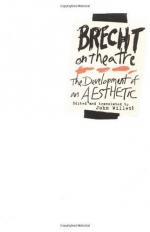
|
| Name: _________________________ | Period: ___________________ |
This test consists of 5 short answer questions, 10 short essay questions, and 1 (of 3) essay topics.
Short Answer Questions
1. Literary works cannot be taken over like _____.
2. The actor masters his character by paying critical attention to its _____.
3. Brecht's first book of poems contained songs and _____.
4. Who wrote the music for Mother Courage?
5. Life of Galileo has the main character giving a boy a lesson on _____.
Short Essay Questions
1. Why does Brecht say that mere catastrophe is a bad teacher?
2. What role does observation play in acting?
3. What is Brecht's view on rehearsal of details?
4. How did Neher and Brecht agree and disagree with Aristotle in the style of presentation of Antigone?
5. What system of production is present in bourgeois society?
6. How was performance kept subordinate to the story in Antigone?
7. Why does Brecht complain about the use of Volkstumlich in the German language?
8. How is a theatre's cultural standard decided and what is the fear that arises?
9. What is Brecht's view on casting?
10. What is Brecht's definition of theatre?
Essay Topics
Write an essay for ONE of the following topics:
Essay Topic 1
Explain the term 'epic theatre'. What is the goal of epic theatre? How is it different from previous forms of theatre?
Essay Topic 2
Explain Brecht's criteria for the subject matter of theatrical works. What is the ideal subject matter of epic theatre? What is its function?
Essay Topic 3
Explain Brecht's analysis of opera in terms of story, intent, and musical expression. What does he suggest about 'old' opera? What does he say about its history and traditions? What conclusion does he come to about the viability of opera in the modern world?
|
This section contains 580 words (approx. 2 pages at 300 words per page) |

|




